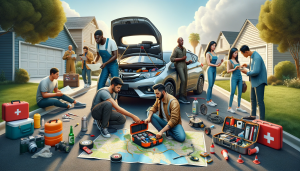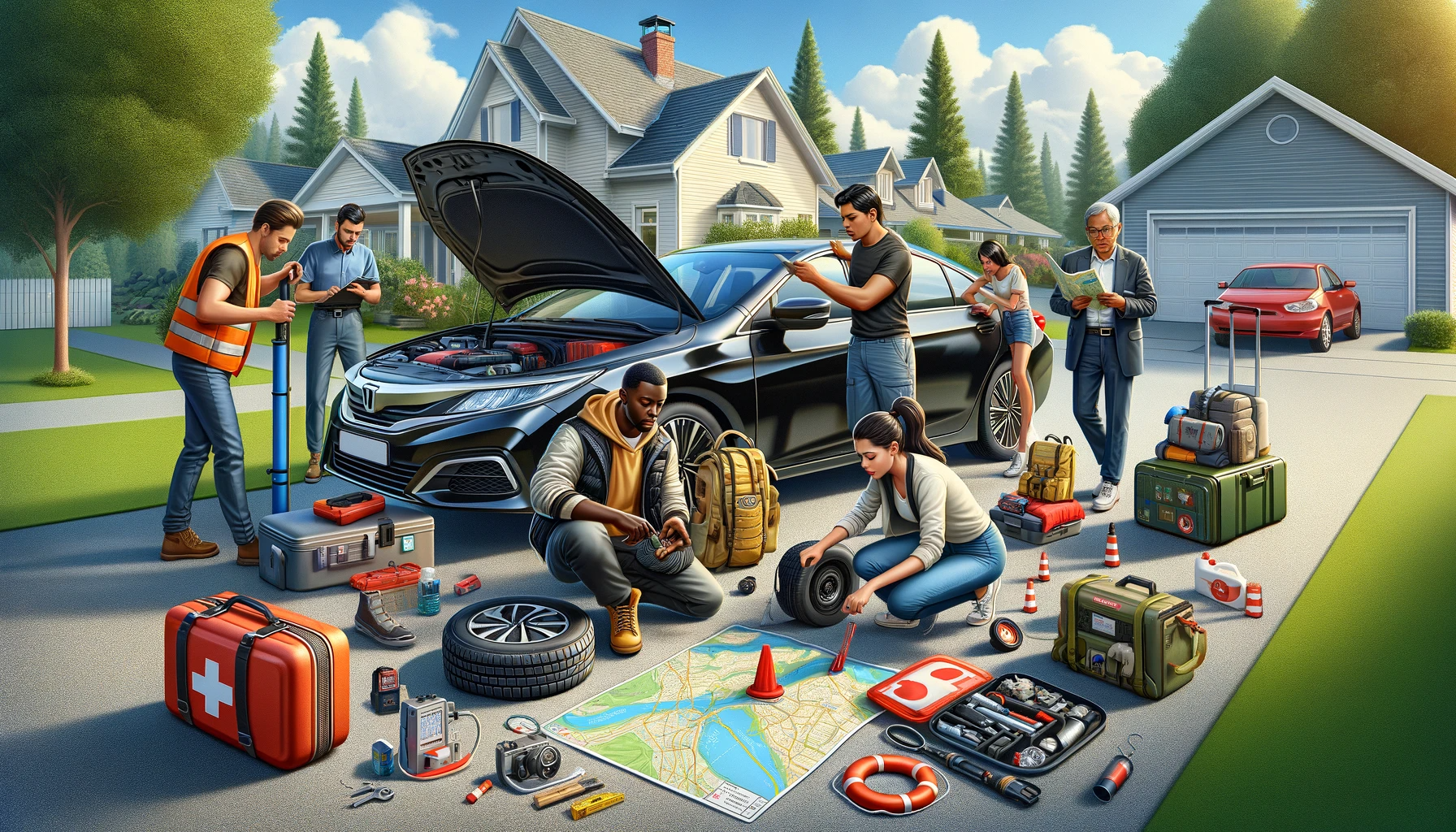Embarking on a road trip can be an exhilarating experience, offering a sense of freedom and adventure. However, it's crucial to prioritize safety to ensure your journey is memorable for all the right reasons. In this comprehensive guide, we'll share in-depth insights on how to prepare for a road trip without risking an accident, covering everything from vehicle maintenance to safe driving tips, and much more.


Planning Your Route
Before you hit the road, careful planning is key. It's not just about the destination; it's also about the journey itself. A well-thought-out route can make your road trip more enjoyable and safe. Start by selecting your destinations and mapping out your journey. Consider travel route safety measures and potential hazards along the way. Utilize GPS navigation and safety technology to stay informed about real-time traffic conditions and road closures. Planning your route in advance can help you avoid traffic jams and reduce the risk of unexpected detours and accidents. When planning your route, also factor in your interests. Are there any scenic spots, historic sites, or natural attractions you'd like to visit along the way? Incorporating these into your itinerary can make your road trip even more memorable. Additionally, consider the time of day you'll be traveling. Driving during daylight hours is generally safer, as visibility is better. If you must drive at night, ensure your headlights are in perfect working condition, and stay extra vigilant.Vehicle Readiness
Ensuring your vehicle is in optimal condition is paramount for a safe and stress-free road trip. A thorough car safety inspection is vital before you embark on your journey. Here are some key areas to focus on:- Fluid Levels: Check your vehicle's oil levels, coolant levels, and brake fluid. Ensure they are at the recommended levels for safe operation.
- Tire Inspection: Examine your tires for proper inflation and tread depth. Bald or underinflated tires can increase the risk of accidents, especially on long road trips.
- Brake Check: Test your brakes to make sure they respond smoothly and effectively. If you notice any squeaking or grinding noises, it's essential to have them inspected and serviced before your trip.
- Lights and Signals: Ensure all lights and signals are functioning correctly. This includes headlights, taillights, turn signals, and brake lights.
- Battery: A dead battery can leave you stranded, so make sure your battery is in good condition. Clean the battery terminals and check for any corrosion.
- Air Conditioning: Ensure your vehicle's air conditioning system is working correctly, especially if you'll be traveling in hot weather.
- Emergency Tools: Don't forget to pack essential emergency tools like a jack, lug wrench, and a spare tire. These tools can be lifesavers if you encounter a flat tire.
- Fluids and Maintenance: Consider getting an overall vehicle inspection from a mechanic to address any potential issues and ensure your vehicle is in its best shape.
- Fuel Up: Start your road trip with a full tank of gas. It's also a good idea to keep your gas tank at least half full throughout your journey, as remote areas may have limited fueling stations.
- Check Your Documents: Ensure you have your driver's license, vehicle registration, and proof of insurance readily available in case you need them.

Safe Driving Tips
Safe driving is paramount for a successful road trip. While the open road may beckon with opportunities for adventure, it's crucial to adhere to safe driving practices to protect yourself and others on the road.- Defensive Driving: Adopt defensive driving techniques. This means being aware of your surroundings, anticipating the actions of other drivers, and keeping a safe following distance. Avoid aggressive maneuvers and stay calm in challenging situations.
- Stay Alert: Fatigue can be a significant road trip hazard. Ensure you get enough rest before embarking on your journey, and take regular breaks to rest and stretch during the trip. If possible, switch drivers to stay sharp and focused.
- Speed Limits: Always obey posted speed limits. Speeding not only increases the risk of accidents but can also lead to hefty fines and penalties.
- Seat Belts: Ensure that all passengers in your vehicle are wearing their seat belts at all times. Seat belts are the most effective way to prevent injuries in the event of a collision.
- Avoid Distractions: Distracted driving is a leading cause of accidents. Put away your phone, avoid eating or engaging in other distracting activities while driving.
- Use Turn Signals: Signaling your intentions by using turn signals is a simple yet crucial safety measure. It helps other drivers anticipate your actions on the road.
- Adapt to Weather Conditions: Be prepared to adjust your driving to suit the weather conditions. Reduce your speed in rain, snow, or fog, and increase your following distance to allow for longer braking distances.
- Stay Informed: Keep an eye on weather forecasts and traffic updates throughout your journey. Modern navigation apps and in-car systems can provide real-time information to help you make informed decisions on the road.
- Keep a Safe Distance: Maintain a safe following distance from the vehicle in front of you. The rule of thumb is to stay at least one car length behind for every 10 mph you're traveling.
- Use Your Mirrors: Regularly check your rearview and side mirrors to be aware of vehicles around you. Blind spots can be dangerous, so make use of your mirrors when changing lanes or merging onto highways.
Travel Safety Checklist
A comprehensive travel safety checklist can serve as your blueprint for a secure journey. Here's a list of essential items and preparations to consider before hitting the road:- Emergency Kit: Assemble an emergency kit for road trips, complete with first aid supplies, a flashlight with extra batteries, a multi-tool, and a blanket. This kit can be a lifesaver in case of unexpected situations.
- Non-Perishable Snacks: Stock up on non-perishable snacks and bottled water to keep you fueled and hydrated throughout your journey.
- Roadside Assistance: Consider joining a roadside assistance program that can provide help in case of vehicle breakdowns or accidents. Services like AAA offer peace of mind on the road.
- Jumper Cables: Carry jumper cables in case you need to jump-start your vehicle or assist another driver in need.
- Maps: While GPS navigation is excellent, it's also wise to have physical maps of the areas you'll be traveling through, especially if you encounter signal issues.
- Cash and Coins: Keep some cash and coins on hand for tolls, parking, and unexpected expenses.
- Phone Charger: Bring a phone charger and a power bank to ensure your mobile devices stay charged for navigation and emergencies.
- Travel Pillow and Blanket: Comfort items like a travel pillow and blanket can make long drives more pleasant and restful.
- Medications: If you or any passengers require medications, ensure you have an adequate supply for the duration of your trip
- Medications: If you or any passengers require medications, ensure you have an adequate supply for the duration of your trip. Keep them in a readily accessible and secure location within the vehicle.
- Entertainment: Long hours on the road can be tiring, so pack some entertainment options to keep everyone in the vehicle engaged. Consider bringing books, audiobooks, music playlists, or travel games to make the journey more enjoyable.
- Travel Documents: In addition to your driver's license, vehicle registration, and proof of insurance, make sure you have other important travel documents, such as your passport (if applicable), and any necessary permits or visas for your destination. It's a good practice to carry both physical and digital copies.
- Emergency Contacts: Prepare a list of emergency contacts, including family members, friends, and contacts at your destination. Share this list with your fellow travelers and store it in your emergency kit for easy access.
- Health and Travel Insurance: Review your health insurance and consider obtaining travel insurance that covers medical emergencies, trip cancellations, and other unforeseen events. It's essential to understand the extent of your coverage and have the necessary information on hand in case of emergencies.
- Weather-Appropriate Clothing: Depending on your road trip destination and the time of year, pack weather-appropriate clothing. Be prepared for varying weather conditions by bringing layers, rain gear, or warm clothing as needed.
- Vehicle Documentation: Alongside your personal documents, ensure you have copies of your vehicle's registration, insurance, and any relevant maintenance records. These documents can be helpful if you encounter any legal or technical issues on the road.
- Vehicle Manual: Keep your vehicle's manual handy, as it contains valuable information about your car's features, troubleshooting, and maintenance procedures. It can be especially useful if you encounter unexpected issues during your journey.
- Communication Devices: Ensure you have reliable communication devices such as a working mobile phone and charger. If you're traveling through remote areas, consider a satellite phone or a portable radio for added safety.
- Rest Stop Information: Research rest areas and service centers along your route. Knowing where to find restrooms, food, and fuel stops can help you plan your breaks effectively and avoid unnecessary stress.
- Local Emergency Numbers: Be aware of the local emergency numbers at your destination. While 911 is a common emergency number in the United States, other countries may have different numbers for police, medical emergencies, and fire services.
- Language Tools: If you're traveling to a foreign country with a language barrier, consider carrying translation apps or a basic phrasebook to help with communication.
- Travel Itinerary: Share your travel itinerary with a trusted friend or family member who is not on the trip. This way, someone will have a record of your planned stops and expected arrival times.
- Carry Cash: While credit and debit cards are widely accepted, having some cash on hand can be useful in case you encounter businesses that don't accept cards or experience card payment issues.
- Travel Comfort Items: Pack comfort items like neck pillows, sunglasses, and sunblock to make your journey more comfortable.
- Environmental Responsibility: Practice responsible tourism by bringing reusable water bottles and bags to reduce plastic waste. Dispose of your trash properly at designated stops.
- Travel Apps: Download relevant travel apps for navigation, weather updates, and local information. These apps can enhance your road trip experience and provide valuable information on the go.
- By carefully preparing and following this comprehensive travel safety checklist, you can ensure a smoother, safer, and more enjoyable road trip. Remember that thorough planning and attention to detail contribute to the success and memorable moments of your adventure.

Conclusion
Embarking on a road trip is a thrilling endeavor that offers the promise of exploration and adventure. To make the most of this experience and ensure your journey is memorable for all the right reasons, prioritize safety, preparation, and responsible travel practices. From meticulously planning your route to performing vehicle maintenance, following safe driving tips, and packing essential items, each aspect of preparation contributes to your road trip's overall success. A well-prepared road trip not only reduces the risk of accidents but also allows you to fully immerse yourself in the beauty and wonder of the open road. So, as you gear up for your next road trip, remember that safety and preparation go hand in hand with adventure and excitement. By following the guidance outlined in this comprehensive guide, you can set off with confidence, knowing that you've taken the necessary steps to make your journey safe, enjoyable, and truly unforgettable.Look for an attorney who has the right legal resources for your legal needs.
Contact us here on the Warmuth Law website or through our hotline 888-517-9888.











